- Home
- Lauren Willig
The Summer Country Page 6
The Summer Country Read online
Page 6
Robert breathed in sharply through his nose. “Another one of Father’s follies. Taking a Redleg from the charity school!”
That wasn’t entirely fair. True, their father had taken a boy from the charity school, one of the poor whites who lived in the section of the island known as “Scotland” for its inhospitable terrain, but it wasn’t pure charity. “Father said that the head of the St. Philip vestry told him that the man had the best mind for numbers he’d ever seen.”
“He’s a Redleg,” repeated Robert, as though Charles were very slow. “Do you know that even the slaves give them alms? They’re utterly shiftless.”
“Perhaps that’s because they’ve lacked the opportunity to be otherwise.”
“You sound like Father.” It was not meant as a compliment.
The two brothers stared at each other, the air between them thick with tension. Charles held his tongue, resisting the urge to snap back. Robert was just trying to provoke him, that was all. He felt slighted, and rightly. But that didn’t mean Charles was going to tarnish their father’s memory. Not when he agreed with him.
At long last, Robert said, as though he too were trying to curb his tongue, “Would you beggar us on a principle, Charles? The man was living in a cave. What does he know about the workings of a place such as this?”
“More than I, I imagine,” said Charles quietly. They both knew it.
“But you’re a Peverill. You belong here.” The words came out gruffly. Charles could sense how much it cost Robert. He believed it, Robert. He believed the feudal myth, that they were somehow bound to the land, they in it and it in them.
But Charles didn’t, and he wouldn’t lie. “I could be a hundred Peverills and still as little use. Does blood count for more than experience? Lineage won’t make our ledgers tally.”
Robert made an impatient gesture. “Devil take it, Charles, there are customs, traditions—you can’t reduce Peverills to numbers on a page!”
“I don’t intend to—but you can’t deny there’s something to be said for numbers.” Striving for a conciliatory tone, Charles said, “I’m seeing Fenty in an hour. If he’s as incompetent as you claim, we’ll find another bookkeeper. Would you like to come with me?”
For a long moment, Robert stared at him, as though trying to work something out. Then he gave his golden head an abrupt shake. “Some of us have work to do. I should have been in the east field an hour ago.” Pointedly, he added, “An overseer is only as good as the estate manager.”
He strode away, boots echoing on the planks of the floor. Charles was left sitting alone at the great dining room table, surrounded by a king’s feast of uneaten food, one bread roll torn to crumbs—and a note secured with a red wax seal.
As Charles rose slowly from his seat, he realized, in his indignation about the bookkeeper, Robert had avoided any discussion of his intentions toward the heiress next door.
Vaguely, Charles thought it might solve two problems to send Robert to ride with Miss Beckles. But first, he had a bookkeeper to meet.
The bookkeeper’s house was only a short walk from the great house, but it might have been in another country.
Once Charles passed the lime hedge that marked the boundaries of the great house, the carefully cultivated oasis of mango, tamarind, and frangipani gave way to a more workmanlike world of sheds, outbuildings, and close-cut grass, the sounds of industry and the rustle of the cane louder than they had been before.
The overseer’s house was closest, a white-walled building with a veranda that gave it claims to elegance. Some way past that sat the bookkeeper’s house, a simple two-story block, roughly built of the local stone.
Although, Charles imagined, to a man raised in one of the tumbledown shacks in St. Andrew, this must seem like luxury indeed. He had, he realized, neglected to ask if the new bookkeeper had a family. Their last bookkeeper had. Two nearly grown girls, or at least they had seemed quite old to him then. He had no idea what had become of them, although he did know, from his father’s letters, that the bookkeeper had succumbed to drink and been let go.
The sunlight was making Charles’s head ache again. Or maybe it was this constant shifting between what was and what wasn’t, nineteen years gone with only his father’s letters in the between. Charles kept seeing the shadows of buildings and people that were no longer there, hearing the laughter of children long since grown.
The daughters, he vaguely remembered, used to feed him cake. There had been washing on a line behind the house.
Washing and daughters were gone now, as was the cake. Instead there was a man standing outside the bookkeeper’s house, managing to give an impression of impatience even though he was standing utterly still.
“Mr. Davenant?” The bookkeeper doffed his hat, revealing hair once red, burnt by the sun into shades of orange and straw, roughly cut and clubbed back with a black ribbon. “I’ve the books ready for your inspection.”
The man was of only medium height, but wiry, with an air of command that ill-fitted his station. Charles found himself following the man through the green-painted front door, feeling, obscurely, that he was being done a favor.
They passed through a sitting room, furnished in a Spartan fashion with leavings from the great house—chairs with upholstery faded by the sun, framed maps on the wall—and into a small office crowded with ledgers. Ledgers in various stages of decrepitude were stacked one atop the other on the shelves that lined one wall. Others, more recent, were piled on a table in the middle of the room.
“Sir,” said Fenty. The syllable seemed to sit uncomfortably on his lips. He indicated the room’s one chair, a straight-backed affair with a cane seat that looked more suited to penance than comfort.
Charles took it. “So,” he said, wishing he had any idea of how to go on. “You have accounts for me?”
Not just accounts. His accounts had accounts. It was, Charles thought, a bit like the time a mechanically minded friend, after a few too many bottles of port, had decided it would be entertaining to take apart Charles’s watch to show him how it worked. All of those tiny gears were fascinating, no doubt, but Charles remembered the disorienting sense of seeing something familiar reduced to incomprehensible components, and wanting, more than anything, for it just to be put back together again.
Seed, supplies, stock. They grew more than sugar. Charles had known that, he supposed, but here it was in black and white, so many acres of Guinea corn, of sweet potatoes, of yams. There were trees to be planted and felled, turned into wheels and barrels and wagons. Cows and pigs and horses. Sugar, in all its forms. Sugar planted, sugar sold, sugar turned to rum.
Then there was the human stock. Fenty was thorough, Charles had to grant him that. The slaves were divided into lists, male and female, subdivided by occupation. Sick nurses, midwives, cooks, water carriers, maidservants. Stockkeepers, drivers, coopers, carpenters, smiths, masons, boilers, basketmakers, field hands.
And next to each name: age, occupation. Value.
His father, raised in England, come to Barbados as a grown man, had had grand ideas of freeing their slaves. Not all at once, but gradually. Like the ancient Saxons, he liked to say, moving from slavery to freedom. We’ll start with villeins and turn them into good yeomen.
The ledgers told another tale.
Betsy Rose, second gang, 100 pounds.
Sarcy Ann, second gang, 80 pounds.
Jubah, second gang, 75 pounds.
Thirty-four women and twenty men in the first gang, twenty women and seventeen men in the second gang. Page after page, on and on. The infirm gang. Infants.
The names and numbers, written in a cramped but tidy hand, danced in front of Charles’s eyes. “So many souls in our care.”
Fenty made a noise that was not quite a snort. “Fewer than you need.”
Charles straightened; he hadn’t realized how long he had been bending over the ledgers. His back ached with it. Sitting, he realized, also put him in the uncomfortable position of having to look up a
t his bookkeeper. “What would you recommend?”
“Lease,” said the bookkeeper succinctly. “Beckles has people to spare. It’s cheaper than buying, and faster than breeding.”
In front of Charles was a page marked merely “Increase,” next to another marked “Decrease.” Five female infants and three male infants born, four men and three women deceased, with a resulting balance of seventy-five pounds.
There was an identical list for bulls and cattle.
He’d known they owned slaves, yes, but his father’s letters had been full of elevated ideals, not these blunt valuations. His father had managed to make it sound more like a grand experiment than a trade in human souls, like an exercise in virtue, even. He’d corresponded with William Wilberforce, written enthusiastically in favor of abolition. Charles had dined out in reformist circles in London on the strength of his father’s pen.
But this, these ledgers in front of him, was something else entirely. This was business, pure and simple.
Seventeen pounds, ten shillings for clothing for breeding women; forty-five pounds for nourishment. Rewards of six shillings, thruppence per woman for successfully bringing forth a child.
Charles closed the book with a snap. “Is that the last of them?”
“Almost.” Fenty was holding another ledger in his arms, but he made no move to set it down on the table. “There are still the accounts for the house.”
Charles straightened. “What is it?”
Fenty’s calloused hands tightened on the book. Then he set it down with a decisive bang. “Someone is pilfering. Candles, linens, tea. Porter. Anything that won’t be immediately missed.”
“How long has this been going on?”
“Since before I arrived.” Charles waited, saying nothing, and Fenty added, grudgingly, as though every word would be weighed against his account, “I tried to trace it, but the books before I got here—they were in a state. Entries missing, crossed out, books misplaced. I had to build the current accounts from scratch.”
The way Fenty held himself reminded Charles of a pugilist, waiting for the other man to throw the next blow.
“You’ve done an admirable job of it,” Charles said, and watched the man’s wariness turn to surprise. Charles gestured toward the incriminating ledger. “May I take this with me?”
Fenty shrugged. “They’re your books.”
And that, thought Charles, was all the thanks he was going to get. Fenty wasn’t going to win any awards for charm. But there was something obscurely reassuring about his very bluntness. Charles pushed back his chair, feeling the kinks in his bones as he stood. “Let me speak to my brother about this.”
The bookkeeper turned away to put the other ledgers back on the shelf, his voice carefully expressionless. “I already spoke to Master Robert, sir.”
“And?”
“He told me to mind my own damned business.”
Of course he had. Charles swallowed a surge of annoyance, not at Fenty, but at Robert, Robert who couldn’t bear the thought of a Redleg meddling in estate business.
Pride was one thing, but this was pure stubbornness. Charles remembered his father, long ago, telling him about his mother’s family. They’re all proud as sin, the Peverills. They were cavaliers to the core and they’ll never let you forget it.
But he wasn’t just a Peverill, whatever Robert might believe. They were Davenants too, and whatever Charles might think of his father’s family, at least they weren’t still mired in some forgotten dream of the seventeenth century, of feudal loyalties and great estates. This was the nineteenth century, for good or for ill, and changes would be made.
He couldn’t criticize his brother, but he could say, “It’s my business and you’re meant to mind it. You’ve done as you should, Fenty.”
Was that relief in the other man’s face? He’d turned away before Charles could tell. “Thank you, sir.”
The interview, somehow, had been terminated, and Charles wasn’t the one to have ended it. “If you find any other, er, anomalies, don’t hesitate to bring them to my attention.”
“Yes, sir,” said Mr. Fenty. “Shall I have the book brought to the great house for you, sir?”
“I believe I can manage it,” said Charles, and was bending to pick up the ledger when they were interrupted by the sound of footsteps and a female voice calling.
“Mr. Davenant? I was told I might find you here.” A woman appeared in the doorway, the train of her riding habit looped over one arm.
“Miss Beckles?” said Charles.
The voice he recognized, throaty and distinctive. Otherwise, he wouldn’t have known her. Between the drink and the candlelight, he had seen her last night only as a blur of pink satin and crepe. In a red riding habit, she presented a different figure entirely. The blurred features of last night reserved themselves into a snub nose, a determined chin, and a well-set pair of gray eyes.
She was also, he realized, smaller than he remembered. In her bright habit, she looked like a little girl playing dress-up. But there was nothing girlish about the way she advanced into the room.
“It’s best to ride early in the day,” she said without preamble, as though Charles were responsible for keeping her waiting. Which, he supposed, in a way, he was. Did silence imply consent? He was sure his fellow students at Lincoln’s Inn would have a grand time debating the point. Miss Beckles, on the other hand, looked as though she wouldn’t brook any legal quibbles.
“I beg pardon,” said Charles awkwardly. “I meant to send a message—”
“No matter,” said Miss Beckles brightly, cutting him off before he could tender his regrets. And then, to Charles’s surprise, she leaned over his arm to squint at the crabbed accounts lying open on the table. “Someone’s been playing with your accounts. Those numbers are all wrong.”
“Yes, I know,” said Charles. “But how did you—?”
“Here and here. The numbers don’t add up.” She looked pointedly at Fenty’s back. “No matter how good a manager one has, it’s always best to review the accounts.”
Her manager, Charles recalled, was her uncle. “Even among family?”
“Especially among family.” There was something hard about her face, something that made her look years older. She put a hand on Charles’s arm. “Shall we, Mr. Davenant? It’s not kind to keep the horses waiting. Unless you’d rather I review your books for you.”
“That,” said Fenty flatly, “will not be necessary.”
“I wouldn’t trouble you, Miss Beckles,” said Charles, looking down at that small, gloved hand on his arm and wondering just when the day had entirely escaped his control.
“It’s no trouble at all,” said Miss Beckles, and Charles had the sense that it was the most honest thing she had said. “I like numbers. And it’s important to keep track of one’s own books. People take advantage if you let them.”
Fenty’s back was displaying signs of indignation, like an offended cat. Charles hastily took Miss Beckles’s arm, guiding her from the room. “If you could have the ledger sent on, Fenty, I would appreciate it. And thank you again for speaking to me of this matter.”
“Sir,” said Mr. Fenty. “Ma’am.”
“You’d best watch that one,” said Miss Beckles as they proceeded down the steps. “My father always said you could never trust a Redleg.”
Goaded, Charles said, “And who would you trust?”
“My maid,” said Miss Beckles, and there was a strangely defiant note in her voice. But before Charles could make too much of it, she affected a light laugh and said, “And there she is with the horses! I had yours brought round for you. It seemed simplest.”
For whom? Charles wanted to ask, but couldn’t. There were disadvantages to being a gentleman.
There were three horses inspecting the grass outside the bookkeeper’s house, their reins held, not by a groom, but by a woman, clad in a severely cut riding habit. Her face was hidden by her hat, but there was something about her stance, a stillness, that t
ouched a chord of memory.
Candlelight and white lawn; the colonel’s hand on Charles’s arm. The girls at Beckles are counted exceptionally pretty.
To hide his confusion, Charles turned to Miss Beckles. The feather on her hat brushed his nose. “You ride with your maid, not a groom?”
“Riding out with only a groom might lead to talk,” said Miss Beckles, and there was a grim note to her voice that Charles didn’t quite understand.
“It’s not considered out of the ordinary in England,” said Charles. They were closer now, and he felt unaccountably awkward at the idea of facing the maid again. Jenny. That odd interlude the night before felt like a fever dream. He might have imagined it. He must have imagined it.
“I would not wish to give any appearance of impropriety,” said Miss Beckles. She smiled up at Charles a little too brightly. “And there can’t be any impropriety with Jenny as my shadow, can there? She guards me as well as any groom.”
“Guards?” It seemed a curious choice of word.
“Accompanies,” amended Miss Beckles. “Would you prefer to ride first and then eat, or eat and then ride? Cook packed enough for a garrison.”
“I—” Charles scrabbled to find a way to politely refuse but found himself at a loss as Jenny stepped forward, wordlessly handing him the reins of his horse. Her gloved hand brushed his, turning him tongue-tied with awkwardness.
“Let’s eat first, then, shall we? There’s a glade just between our properties that makes a splendid place for a picnic,” said Miss Beckles, taking his silence for assent. “I’ll show it to you.”
Chapter Five
Christ Church, Barbados
February 1854
Adam was only too delighted to abandon their picnic for the promise of a proper meal.
“I do hope you will forgive the lack of formal invitation,” said Mr. Davenant earnestly. He spoke to them all, but his eyes strayed to Laura. “We don’t stand on ceremony here on our little island.”
“You are very kind,” said Laura.

 That Summer
That Summer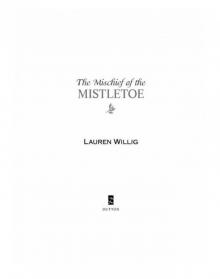 The Mischief of the Mistletoe
The Mischief of the Mistletoe The Mark of the Midnight Manzanilla
The Mark of the Midnight Manzanilla The Other Daughter
The Other Daughter The Ashford Affair
The Ashford Affair The Lure of the Moonflower
The Lure of the Moonflower The Secret History of the Pink Carnation
The Secret History of the Pink Carnation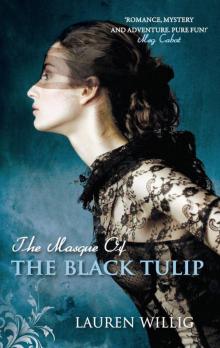 The Masque of the Black Tulip
The Masque of the Black Tulip The Passion of the Purple Plumeria
The Passion of the Purple Plumeria The English Wife
The English Wife The Garden Intrigue
The Garden Intrigue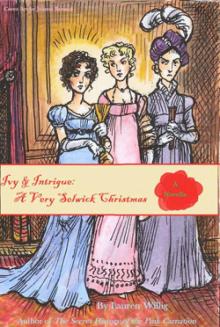 Ivy and Intrigue: A Very Selwick Christmas
Ivy and Intrigue: A Very Selwick Christmas The Orchid Affair
The Orchid Affair The Summer Country
The Summer Country The Betrayal of the Blood Lily
The Betrayal of the Blood Lily The English Wife: A Novel
The English Wife: A Novel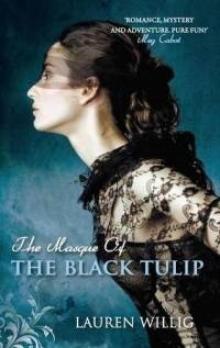 Masque of the Black Tulip pc-2
Masque of the Black Tulip pc-2 The Secret History of the Pink Carnation pc-1
The Secret History of the Pink Carnation pc-1 That Summer: A Novel
That Summer: A Novel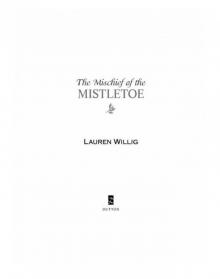 The Mischief of the Mistletoe: A Pink Carnation Christmas
The Mischief of the Mistletoe: A Pink Carnation Christmas